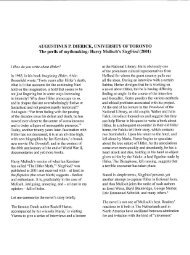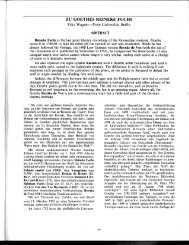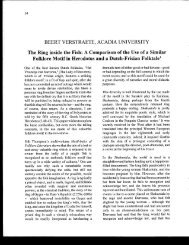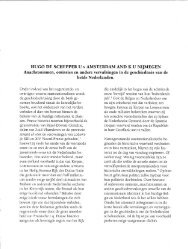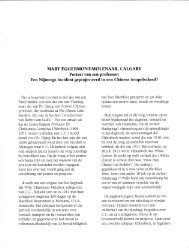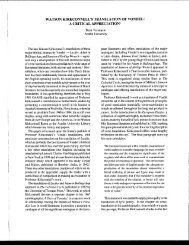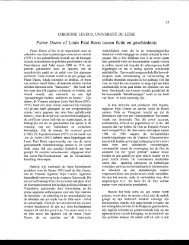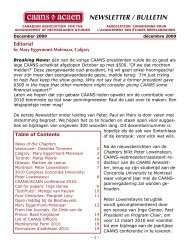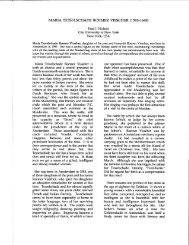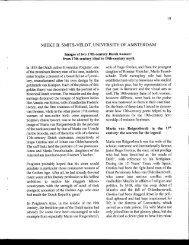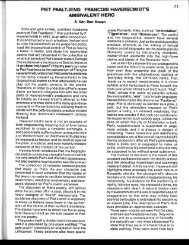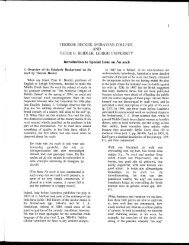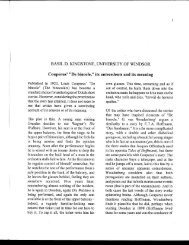newsletter / bulletin - canadian association for the advancement of ...
newsletter / bulletin - canadian association for the advancement of ...
newsletter / bulletin - canadian association for the advancement of ...
Create successful ePaper yourself
Turn your PDF publications into a flip-book with our unique Google optimized e-Paper software.
CAANS NEWSLETTER - April 2011 BULLETIN DE L’ACAEN - avril 2011<br />
return or not – and <strong>the</strong> consequent withdrawal <strong>of</strong> each language group into its own<br />
shell, leading to <strong>the</strong> inability <strong>of</strong> unseasoned regional politicians to negotiate to <strong>for</strong>m a<br />
federal government in 2007.<br />
Leopold III: abdicatierede<br />
van 31 juli 1950<br />
Conducted largely in <strong>the</strong> media, <strong>the</strong> negotiations dragged on<br />
<strong>for</strong> 194 days, compromise being reached only when <strong>the</strong> economic<br />
mess finally claimed <strong>the</strong> politicians’ attention.<br />
Jane Fenoulhet (UC London) compares Edgar du Perron’s<br />
Schandaal in Holland (1930) with Hella Haasse’s Mevrouw<br />
Bentinck (1978-81) as <strong>for</strong>ms <strong>of</strong> biographical fiction using<br />
documents. Both authors narrate scandals set in Willem IV’s<br />
time, du Perron telling <strong>the</strong> fairly well-known tale <strong>of</strong> Onno<br />
Zwier van Haren, whose sexual abuse <strong>of</strong> his daughters came<br />
to light and led to his downfall; Haasse telling <strong>the</strong> ra<strong>the</strong>r less<br />
well-known story <strong>of</strong> how Willem Bentinck’s wife refused to<br />
stay with him.<br />
Dirk Venemans (Wassenaar) describes a catalogue <strong>of</strong> prints<br />
<strong>of</strong> paintings – a popular way to spread appreciation <strong>of</strong> art in<br />
<strong>the</strong> late 18th century – written <strong>for</strong> <strong>the</strong> English market. The<br />
painters are all described in glowing terms, complete with <strong>the</strong> prices <strong>the</strong>ir works sell<br />
<strong>for</strong>.<br />
There are reviews <strong>of</strong> <strong>the</strong> first two books in a new series<br />
from Brill in Leiden, ‘Egodocuments and History.’ The<br />
first is a translation <strong>of</strong> Arianne Baggerman and Rudolf<br />
Dekker’s superb edition <strong>of</strong> Otto van Eck’s diary, entitled<br />
Child <strong>of</strong> <strong>the</strong> Enlightenment. The child was given a Rousseauistic<br />
education; he had to read a great deal, and his<br />
diary had to meet his parents’ approval.<br />
The second is a translation <strong>of</strong> Jeroen Blaak’s Geletterde<br />
levens (2004), called Literacy in everyday life.<br />
The original could have usefully been revised a bit, and<br />
<strong>the</strong> four diarists chosen are obviously too few to give<br />
a complete picture <strong>of</strong> <strong>the</strong> whole country and <strong>the</strong> whole<br />
period (1624-1770), but it is ‘an entertaining and welldocumented<br />
study,’ which opens our eyes to <strong>the</strong> wide<br />
variety <strong>of</strong> reasons why people record personal feelings<br />
and public events, thus unifying <strong>the</strong> two <strong>for</strong> <strong>the</strong> historian.<br />
Septentrion <strong>of</strong>fers more interesting material than we can possibly cover, so we will<br />
just <strong>of</strong>fer a few recent highlights. We read an article on Van Gogh, accompanied by<br />
a letter from him to his bro<strong>the</strong>r Theo. The article argues that his life was no more<br />
tragic than anyone else’s (unless you count attacks <strong>of</strong> insanity, <strong>of</strong> course). In particular,<br />
his work was not ignored; on <strong>the</strong> contrary, <strong>the</strong> likes <strong>of</strong> Gauguin, Toulouse-<br />
Lautrec, Pissarro and Monet all admired it. The letter is taken from a new 6-volume<br />
- 16 -



